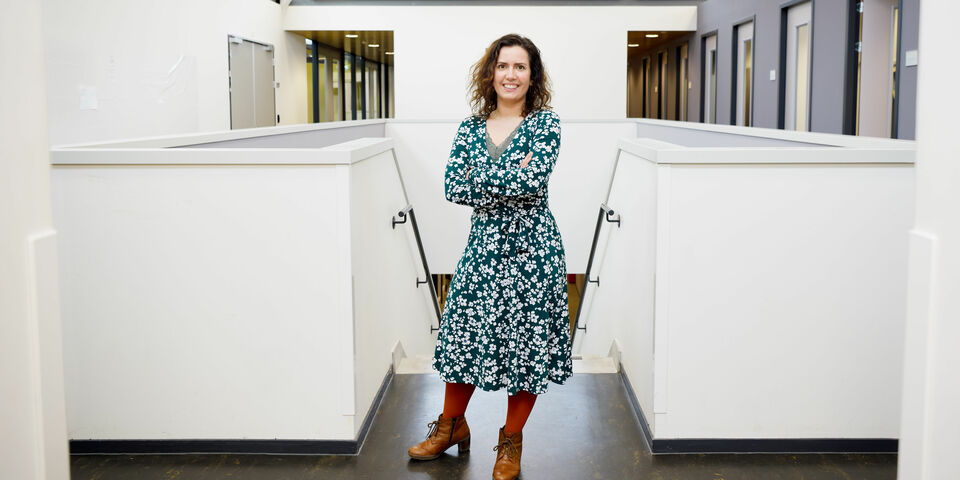New style library: Data Management and Library
TU/e’s Information Expertise Center will have a new name and a new structure. The service Data Management and Library (DML) will focus on open science and data management, but it will also remain responsible for the library and the archive. Three new departments will be set up. The Executive Board recently approved the policy plan of Merle Rodenburg, who has been director of IEC since September 1.
“We are currently in a transitional phase from traditional science to open science,” says Merle Rodenburg, “and that touches on the foundation of how scientists operate.” She believes young scientists should have more clarity about the way in which they will be judged.
“Traditionally, the number of publications in high impact journals were counted, but today it’s the impact that your research has on society that’s taken into account. But how do you do that? Data Management & Library will start an open science program, in collaboration with General Affairs, using input of the scientists themselves. In it, we need to determine how we will assess open access, how we can measure the impact, how we make scientific data accessible, and when we want to do that. Also, our scientists collaborate with companies, how do we deal with that? Quite a complex system, in which TU/e needs to find its bearings.”
Scientific integrity
The new name Data Management and Library isn’t final, because the University Council and the Supervisory Board still need to agree - but the vision has been determined. According to Rodenburg’s recently approved policy plan, DML will have three departments: Library & Open Science, which will address the above-mentioned issues, Research Data Management, and General Data Management. “When you successfully preserve data, make sure that it can be found and read for a period of ten years, so you can minimalize affairs such as the one concerning Diederik Stapel. And when a scandal should arise, you will be able to quickly take action because all the data is still usable.”
Research Data Management (RDM) will also have a positive effect on the reproducibility of scientific research, says Rodenburg, who graduated from the Department of the Built Environment in 2012. “Preserving data is extremely important to scientists, but it’s also the most frustrating part of their work. We want to automatize and take away much of the burden for scientists, but we prefer to teach PhD candidates from day one how to store their data in a structured manner. One way to do that, as I see it, is by offering courses. In my ideal world, those courses would then be offered to Master’s and Bachelor’s students as well.” By offering a well-functioning infrastructure, together with Information Management & Services, RDM hopes to minimalize cyberattacks like the one that took place in Maastricht in December of last year.
Data steward
The next step is to make as much data as possible publicly available for optimal collaboration between universities. This is something funders such as the European Commission and the Dutch Research Council (NWO) demand as well. It’s an international search, and the Netherlands is in the forefront, Rodenburg says. “We are recruiting data stewards at TU/e. People who have conducted doctoral research themselves, but who decided not to pursue a career in science. These researchers offer support as experience experts. There are two stewards for the entire university at this point, but our aim is to have one steward for each department.”
Rodenburg wants to place TU/e’s administrative organization at General Data Management (GDM). “In the past, our primary focus was on archiving documents, but now we can continue to develop into the direction of data storage.” There still are quite a few points for improvements in that area, Rodenburg knows from her experience as former head of the Business Intelligence Cluster. “We need to look at operational management with fresh eyes. All student and employee data, as well as data on finances, salaries, spaces, et cetera, needs to be linked in order to make data driven decisions. A Data Governance Team has been set up that made an inventory of the five most difficult cases, to start with. Think of how the question of how you define data, or spelling errors in data. The team will eventually offer courses to the administrators of the several departments and services at this ever-expanding educational institution.”
Visibility
Rodenburg has much confidence in the planned path, which she describes as a “substantively logical continued development of the IEC.” The issue of staffing will pose some challenges though, she believes. “IEC has shrunk the most, and at the same time, the service has an ageing workforce. The current personnel are very loyal and certainly very experienced in this field, but the staff members will soon retire. We will only manage if we successfully work together. We’re not really at the right location here in ‘the basement’ of MetaForum as far as that is concerned. We need to get off this island and position ourselves next to the services. It will take some organizing before we reach our substantive goals.”



Discussion